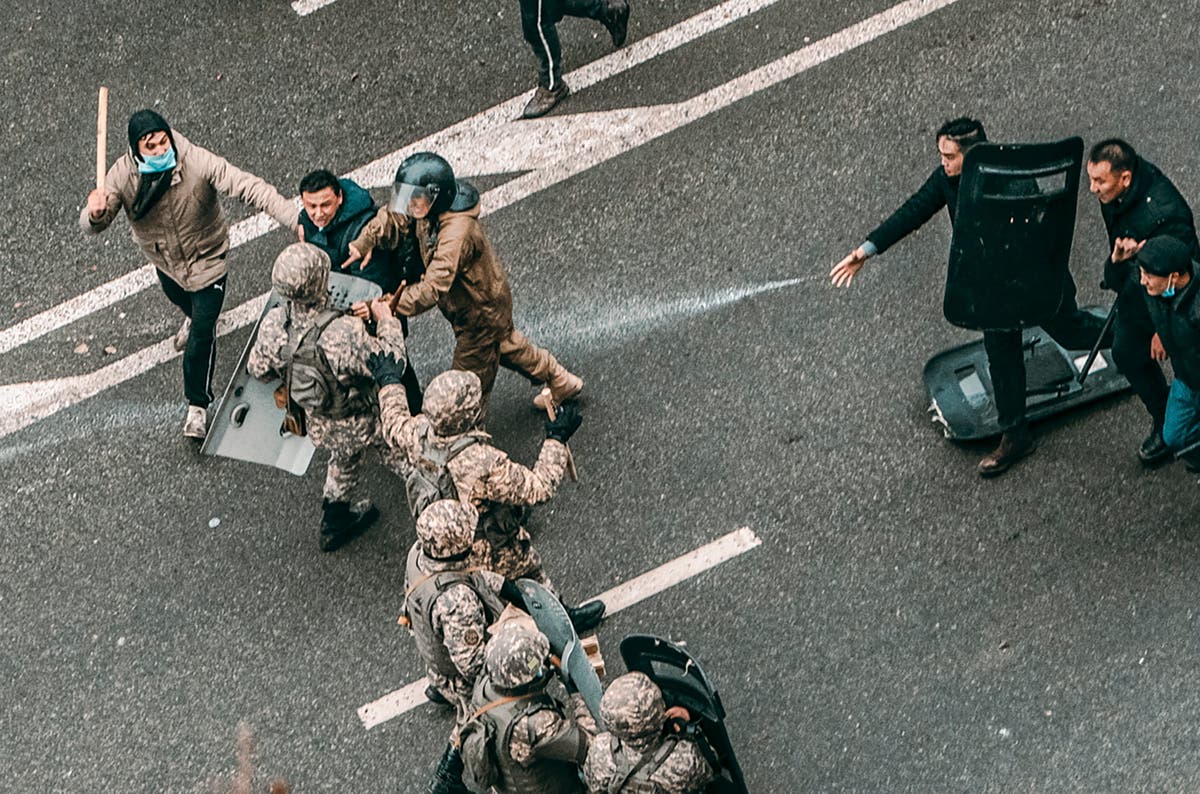[ad_1]
The violent unrest in Kazakhstan, with rising death rates, continued as an “anti-terror” military operation began, in which the country’s authoritarian ruler “fired without warning” the security forces.
What began as protests against rising fuel costs has turned into escalating armed clashes amid fears the unrest will spread in the region and troops from the Russia-led CSTO (Collective Security Treaty Organization) arrive to guard strategic locations
The deployment of around 3,000 troops, the first since the Warsaw Pact CTSO was founded 23 years ago, is a strong sign of how the carefully maintained balance of power in the post-Soviet state, which the West is investing economically and politically, is changing has.
Exxon Mobil and Chevron are among the multinationals that have energy projects in the country. British officials indicate that the international financial center in the capital, Astana, and a special business center with rules under English law have been developed.
Kazakhstan’s President, Kassym-Jomart Tokayev, has followed and strengthened the policies of his predecessor Nursultan Nazarbayev to maintain close ties with the US and Europe as a counterbalance to Russian influence. In return, Western governments have turned a blind eye to the regime’s human rights violations.
The Kremlin’s armed presence in Kazakhstan is because tensions have increased over the mass transfer of more than 100,000 Russian soldiers at the Ukrainian border. A series of talks between American and Russian officials, NATO and Ukraine are slated to begin this weekend amid fears that Vladimir Putin is preparing for military action.
Western officials disagree on whether the events in Kazakhstan and Ukraine are related. A former American diplomat who served in Central Asia said: “This gives Russians an opportunity to show how easily they can have military influence in a country where the US has many energy interests. It can be seen as a warning to the US and its allies that what is happening in Ukraine can have repercussions elsewhere. “
However, some British diplomats rejected any ties with Ukraine, also claiming that what was happening in the Central Asian state was a distraction for Putin and also a scenario he did not want on Russia’s southern border – protests and state destabilization.
Faced with growing opposition to his rule, President Tokayev is now reiterating Moscow’s claims of a “foreign hand” behind the riots. He claimed that “terrorists” trained abroad were at work to instigate the attacks by “20,000 bandits” in the capital, Almaty.
Taking on the cloak of a strong leader, Mr Tokayev has vowed retaliation and rejected calls from the international community to speak to the opposition.
In a speech he said: “Abroad, it is demanded that both sides negotiate a peaceful solution. What an idiocy. What kind of negotiations can you have with criminals? We faced armed and well-prepared bandits from home and abroad. Bandits and terrorists who should be destroyed. This will happen in a very short time. “
Ainar Omarov, a student, described how the nature of the protests changed over the week. Initially, the demonstrations were about the sudden rise in fuel prices, but this turned into calls for more political rights and an end to corruption.
The confrontation became more violent on Wednesday night in Almaty, said Omarov. He continued, “The police were tough and many demonstrators now felt they had to fight back. Many government buildings were attacked, but they were just angry people, not terrorists or anything like that. “
Safiya, a 23-year-old activist who did not want her surname revealed, also claimed the government was trying to portray the protests as a riot.
“These are false stories to justify the crackdown on the security forces,” she said. “They say the demonstrators fired guns. That is not true, if the people shot with guns, then they had their own agenda, nothing to do with the protests. “
British and American officials said it was unclear whether the shots taken by the protesters at the security forces after the looting of armories came from extremist elements or from supporters of former President Nazarbayev.
Mr Nazarbayev had succeeded Mr Tokayev after his resignation in 2019 and apparently appointed a technocrat, but retained some of the privileges he had assumed over his three decades in power, including chairing the powerful Security Council.
Mr Tokayev had recently taken over this role from Mr Nazarbayev, and he had also dismissed Karim Masimov, an ally of Mr Nazarbayev, as head of the National Security Committee in charge of the domestic intelligence service (KNB).
The whereabouts of Mr. Nazarbayev, officially known as the “leader of the nation”, is unknown. The former president has extensive ties to the UK. In 2011, former Prime Minister Tony Blair’s consultancy, Tony Blair Associates, signed a contract to advise the Kazakh government.
Mr Nazarbayev’s extended family owns some £ 330 million luxury property in London, according to a report from Chatham House.
These include a £ 140 million lot on Baker Street and a mansion on Bishops Avenue in Hampstead. Timur Kulibayev, related to the Nazarbayevs by marriage, bought Sunninghill Park from Prince Andrew and paid £ 3 million above the asking price.
[ad_2]

